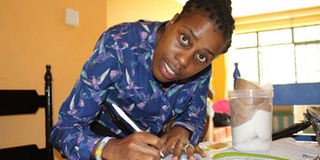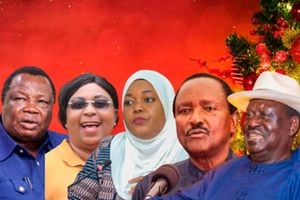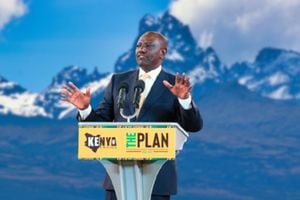I am a forensic scientist: this is what my job involves

Sophie Mukwana, Director of Biotech Forensics. She wanted to be a doctor, but changed her mind after a chance conversation with her academic advisor, a forensic scientist. PHOTO | WILLIAM OERI
What you need to know:
- Sophie has deliberately stayed away from cases related to crime or disaster, following the emotional and psychological toll it took on them. She now prefers to handle paternity cases, where she determines paternity and private investigations, where she mainly does background checks of job candidates for hiring companies.
- Before she hands in her report to the hiring company, she checks with the CID, previous employers, friends, relatives and even landlords to verify the candidates’ credibility.
Sophie Mukwana, like most, wanted to be a doctor growing up, even though she did not really enjoy school much.
“I found it so regimented; it didn’t give much room for enjoyment, you studied to pass exams,” she says.
It was while studying at California State University in Fresno, USA, that she found herself drawn to science. She had grand plans of becoming a doctor, but in the US, a medical degree is a post graduate course, meaning you need to have a science-related degree first before you study medicine. It is for this reason Sophie decided to take up a first degree in Chemistry.
“It was all about understanding the concept, not cramming for an exam, making the course enjoyable,” she says of her experience.
In 2003, Sophie’s last year of college, a chance conversation with her academic advisor changed her career trajectory. He was a forensic scientist who had an illustrious career as a consultant with the Federal Bureau of Investigation (FBI) and had shifted careers to academia.
“This was way before the CSI TV Show; he suggested that I should try forensic science.”
The university was offering an introduction to Forensic Science as a broad spectrum in forensics. Between 2003 and 2004, Sophie took the introductory class to see if she would like forensics. She did, and went on to study her Masters in Forensics Science at University of California, Davis.
“I did not really understand what the subject was about - I had read Sherlock Holmes, Nancy Drew and Hardy Boys books, so I thought I understood a bit about investigation, but not to the level where science was involved.”
In 2006, at around the same time Sophie wrapped up her master’s program in the US, in Kenya, the government was establishing its own forensic labs in Nairobi. Sophie could not imagine her luck because she had planned to return home to kick off her career. She came back home, optimistic, only to find that nobody was hiring. The only person who could hire her was the Government Chemist, who had not hired anyone for years. They were only seeking interns, and Sophie was overqualified for the internship. “There was simply no job for me,” she says.
CRIMINAL CASES
In early 2007, while trying to strategise on a way forward, a friend called her and asked her to tune in to a local radio station, where Lynne Farah, another Kenyan who had studied Forensic Science in the UK, was sharing her life story on a radio show – she hoped to make a difference locally with her training in forensic science.
“I was listening to this lady thinking, wow, this is exactly me. That’s exactly what I want to do.”
Sophie got Lynne’s contacts and called her up. In 2008, the duo registered Biotech Forensics Ltd. It was the first private forensic science laboratory of its kind in East and Central Africa.
The first big case that launched Biotech Forensics was the DNA identification of the people that died in the 2009 Nakumatt fire tragedy in the Nairobi Central Business district.
“We were up day and night for two weeks with huge expectations from the victims’ families hoping to identify their loved ones,” she recalls.
Three months later, they wrapped up the identification of the victims that they could. Following this, Biotech Forensics was contracted by a children’s home to collect DNA samples from young girls who had been sexually abused.
“It was terrible. It came to a point where I stopped dealing with actual forensics – collection and examining of DNA in criminal cases,” Sophie says.
Since then, Sophie has deliberately stayed away from cases related to crime or disaster, following the emotional and psychological toll it took on them. She now prefers to handle paternity cases, where she determines paternity and private investigations, where she mainly does background checks of job candidates for hiring companies. Before she hands in her report to the hiring company, she checks with the CID, previous employers, friends, relatives and even landlords to verify the candidates’ credibility.
In 2010, Lynne, Sophie’s business partner, opted to pursue other interests away from forensics; Sophie now solely runs Biotech Forensics Ltd. In cases where she needs extra help, she outsources it.
Each day of work varies; she receives about 10 phone calls a month from clients seeking paternity testing. She gets lots of walk-ins as well, recommendations from clients she has worked with or even cold calls to her facility. Clients either call or schedule a meeting with her. Thereafter, she provides them with a DNA kit for sampling. The client sends back samples of either blood, or saliva, she processes it, gets results and sends the clients the report or schedules a meeting with them to discuss the findings. For the past year, she has worked closely with the government-run Child Welfare Society, conducting paternity tests to reunite abandoned children with their families.
“When some of these children’s parents or guardians come to claim them, as a requirement, a DNA test has to be conducted to determine identity.”
Sophie has clients from as far as Cote d’Ivoire, Djibouti, Rwanda, Burundi and across Kenya from Eldoret, Nakuru, Bungoma to as far as Garissa counties. In future, she would like to expand her operations in forensics beyond science, to forensic accounting.
“There is a lot of growth potential especially in East Africa; we don’t have enough professionals in that area,” she observes.
The biggest challenge with forensic science, she says, is the cost of operations and general lack of support from government.
“As a forensic scientist I can’t testify in court because the samples from the crime scenes don’t come to me, they go to the government chemist because it is strictly the police who can handle crime. I can’t show up on a crime scene and collect individual samples for analysis. My hands are tied.”
What is forensics?
A forensic specialist is a person who does investigative work for the legal system in crime detection, whatever the profession. They can be doctors, nurses, accountants, engineers, botanists, zoologists, whatever field.
What was the business registration process like for you?
It was really difficult. No one knew what we were doing. Everyone assumed we were police, which we are not. They didn’t know what category to place us in, whether we should be under the Kenya Medical Laboratory Technicians or Technologists board. The name search took a month. We had to get vetted by the National Intelligence Service (NIS). It took a year to get our business registered. There was a lot of back and forth.
What was the most difficult part setting up business operations?
What I do is a lot different from what a scientist working in a lab, or research does. Scientists know little of the business side of things. Having to learn that was more difficult, we had to look for capital to set up, figure out how to market ourselves, bring in customers, and keep a steady cash flow.
How much capital did you raise to set up shop?
We thank our families for support, because the cost of equipment was really high, so was setting up labs and so on. I can say it came to about Sh16.2 million.
What was the first year of operations like?
A lot of it was learning on the job. It was a rollercoaster of emotions. We get one client and we are thrilled, then there is a four-week drought, yet we have not paid ourselves or dealt with the overheads. Also, it was just the two of us; we were everything, the marketer, scientist, accountant. Everything.
Did you undergo any therapy following the conclusion of the Nakumatt fire case?
We didn’t. But I think if we had, it would have helped us. When we were working, it was adrenaline that kept us going, so when it ended, it was a huge punch. We were glad that we had closed a major case, but there was a down side - we were physically and emotionally drained.
What kind of a coping strategy have you adopted over time?
Once I have done a case and wrapped it up. It is closed; I don’t revisit it, or think about it anymore.
What is the hugest challenge with forensic work?
It is difficult, especially with the way we handle our casework locally; you are not guaranteed of a possible outcome. You get a sample that has been sitting out for a long time, contaminated, decayed or degraded. You feel helpless. Then you have those who confuse what a police officer does with what a forensic scientist does. Police do the investigation, scientists evaluate the samples from the crime scene, present the interpreted scientific findings to the police, who then take the necessary course of action based on that.
Have you considered lobbying Kenya’s criminal justice system to work with the private sector to facilitate better processing of forensic evidence in criminal cases?
Biotech Forensics has been trying to do that since inception. The legalities behind it are so complicated. There is what parliament needs to do, laws that they need to enact to allow people like me who are not law enforcement to get involved. Imagine you are required to be in court at 8am, yet your case is not heard until 2pm, and then the judge probably postpones the hearing. That is why many private practitioners opt to stay away. Then there is the issue of payment. The victim cannot pay you, but will the government pay you as it should yet you have used your time and resources? When you think about what it takes, you get discouraged because the process is so tedious.
What’s the upside of working on paternity tests?
The satisfaction is in giving my clients answers that are conclusive to questions they have had for a very long time. You are dealing with live clients as opposed to dead ones; you are not required to go to court most of the time, because all they want to know was the truth. You get paid on time. (Laughs) You have a steady cash flow.
How much do you charge for a paternity test?
Twenty two thousand shillings. We cost more than the Government Chemist, but we cost less than major private hospitals and labs. The skyrocketing of the dollar also made shipping of the reagents we use very expensive. All our supplies are shipped in, you can’t access them locally, and suppliers increase their prices every year without fail. They are purely for profit. I outsource the lab work now to keep the price as is.
How do you assure your clientele that the results are reliable if they are processed by a third party?
The lab that I work with is a credited one. It is well known. They are trusted and have done this for years. The other thing I tell my clients is, get the test done elsewhere and if there is an issue - come back to me. I offer a money back guarantee with these results. If you do the test elsewhere and my results are wrong, I will give you your money back. No one has come back yet.
Where can one study Forensic Science?
They have to do it abroad. The programs offered locally teach science without actual practical experience. Until the local institutions are set up to offer full practical science classes, your chemistry and physics for example, then abroad – Australia, Canada, US or the UK are your options for now.
What does it take to become forensic scientist?
You really have to be good at the science; whatever science you choose. Forensics comes later once you fully understand the science. Figure out what kind of scientist you want to be. And be good at the science and specialise at a Master’s or PhD level - you need to go beyond the undergraduate. You should be professional in your writing and verbal communication skills. In science, it is critical how you write your reports; a lot of judgment is placed on your language and writing skills. Then figure out who is going to hire you, and pay you to do what you love.
Sophie at a glance
Education:
Degree in Chemistry from the California State University, Fresno, US.
University of Carlifonia, Davis: Masters in Forensic Science.
Company: Biotech Forensics, registered in 2009.
Notable assignments: DNA identification of victims of the Nakumatt fire tragedy in Nairobi’s CBD, in 2009.
Numerous paternity tests with clients across Africa.





